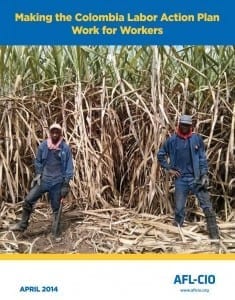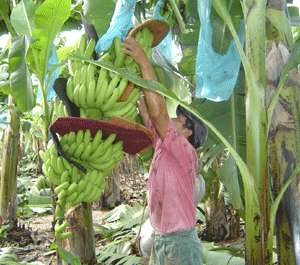Apr 8, 2014
 The governments of Colombia and the United States signed the Labor Action Plan (LAP) three years ago this week. The plan was intended to provide a road map for Colombia to protect internationally recognized labor rights, prevent violence against labor leaders and prosecute the perpetrators of such violence.
The governments of Colombia and the United States signed the Labor Action Plan (LAP) three years ago this week. The plan was intended to provide a road map for Colombia to protect internationally recognized labor rights, prevent violence against labor leaders and prosecute the perpetrators of such violence.
As a new AFL-CIO report shows, systemic violence against Colombian workers continues and workers still face persistent employer abuses. Palm workers like Miguel Conde of the union SINTRAINAGRO at the Bucarelia plantation initially were hopeful, but the LAP profoundly failed to deliver on its promises. In the blog, “Make the Colombia Labor Rights Action Plan Work for Workers,” the AFL-CIO Now writes:
“Like many Colombian workers, palm workers at Bucarelia were increasingly hired on as temporary subcontracts. Subcontracting prevents workers from forming unions, gets employers out of paying social security and other benefits due to direct hires and makes it easier to fire anyone who complains or supports unions., the LAP was supposed to end abusive subcontracting of those doing a company’s core work. When workers at Bucarelia learned about the promised reforms, and that the palm sector had been specifically identified in the LAP, they launched an organizing campaign, thinking they had a way forward.
Jan 17, 2014

A Guatemalan banana worker.
Earlier this month, on January 5, Guatemala’s first homicide of the new year took the life of 19-year-old Marlon Dagoberto Vásquez López, an active youth leader and member of the construction workers’ union, Sindicato Nacional de Trabajadores de la Construcción y Servicios de Guatemala (SINCS-G). His murder brought to 65 the toll of trade unionists assassinated in the country since 2007. Most of their murders have gone unsolved, making Guatemala the most deadly place to be a union member, after Colombia.
The Solidarity Center works with SINCS-G and other Central American unions.
Last Friday, 11 members of the banana worker union, Sindicato de Trabajadores de la Empresa Agropecuaria Omagua, S.A. Campo Verde I y II, held a meeting at their headquarters in Izabal, Guatemala. As they held their meeting, an unknown vehicle approached from the highway fronting the Honduran border and unleashed gunfire upon the plantation workers, shooting Juan DeDios Sagastume Rodas, secretary general for the union. Despite being immediately informed of the attack, the National Police never appeared at the crime scene and waited until the following day to interview the victim at the hospital.
Over the past three years, seven banana union leaders have been murdered in Guatemala. The country has recently committed to a Labor Enforcement Plan as it attempts to avoid arbitration for violating the labor chapter of the CAFTA-DR free-trade agreement. The U.S. government filed the labor complaint in April 2008 based on evidence provided by six Guatemalan unions and the AFL-CIO. The Guatemalan government also committed to the Workers’ Group of the International Labor Organization “to ensure the safety of workers, with effective measures to protect union members and leaders, and their property, from violence and threats.”
The astounding violence of the first weeks of 2014 against trade unionists in Guatemala must end. The American labor movement joins Guatemalan union federation UNISTRAGUA and the Trade Union Confederation of the Americas (TUCA-CSA) to demand President Otto Pérez Molina ensure prompt investigations of these attacks against union members, find the perpetrators and define a policy and actions to guarantee the life and physical integrity of union members and freedom of association
 The governments of Colombia and the United States signed the Labor Action Plan (LAP) three years ago this week. The plan was intended to provide a road map for Colombia to protect internationally recognized labor rights, prevent violence against labor leaders and prosecute the perpetrators of such violence.
The governments of Colombia and the United States signed the Labor Action Plan (LAP) three years ago this week. The plan was intended to provide a road map for Colombia to protect internationally recognized labor rights, prevent violence against labor leaders and prosecute the perpetrators of such violence.
